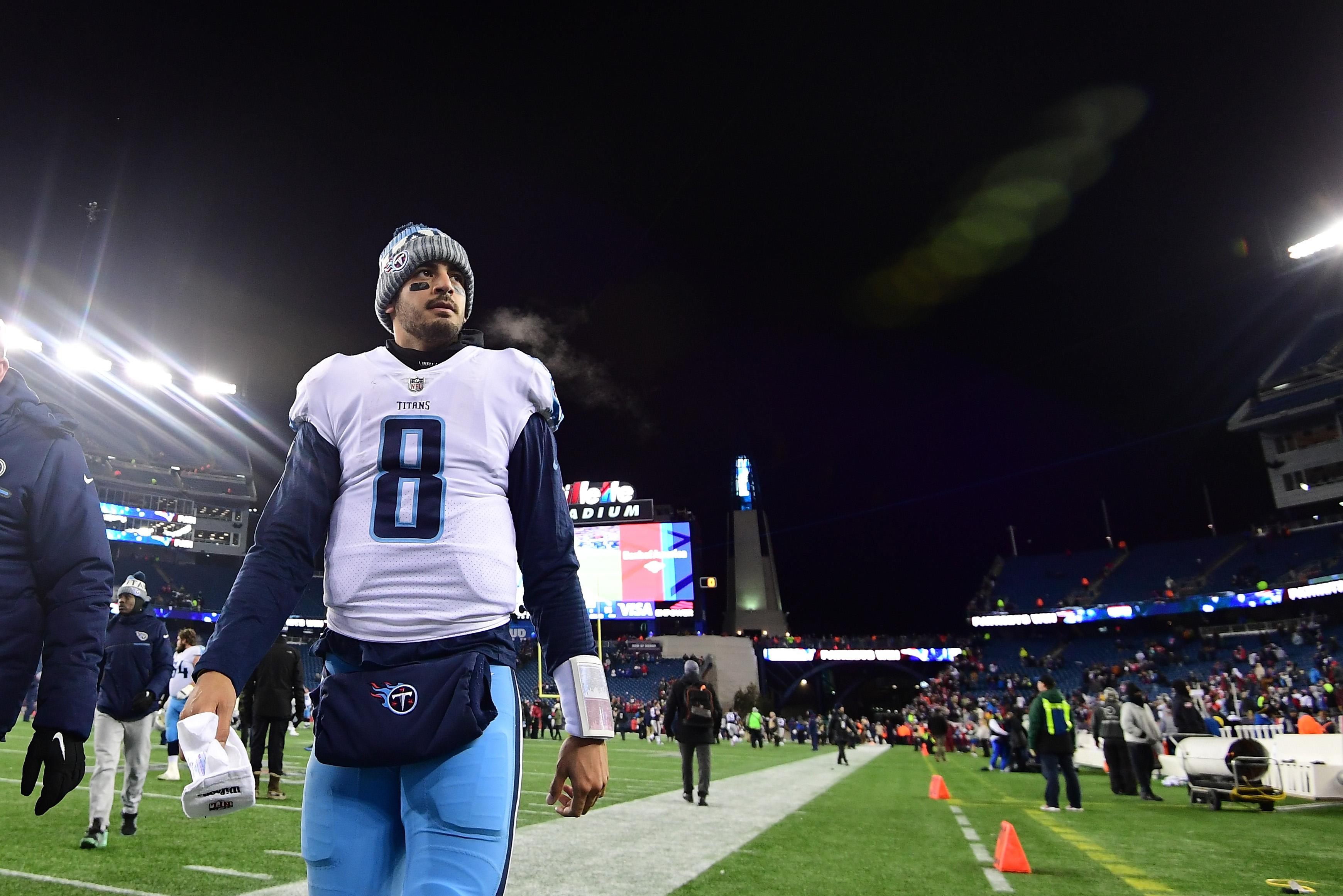
The greatest trick Mike Mularkey ever pulled was convincing the world to use the term “exotic smashmouth” when describing the Titans’ offense. That phrase has been bandied about since Mularkey was promoted from his interim role to head coach two years ago—a catchy, self-appointed moniker for the team’s philosophy that, at least to me, hints at the marriage between innovative, creative play-calling with an old-school physical identity. In practice, Tennessee’s lived up to the “smashmouth” part, building their system around a big, talented offensive line and using a run-heavy approach. But the “exotic” part of the equation has been conspicuously absent, and during the team’s 35-14 blowout loss to the Patriots on Saturday night, one thought kept coming to mind: The Titans are the NFL’s most glaring, frustrating example of an old football trope—that of the stuck-in-the-past coaching staff who’s unwilling or unable to adapt to the changing times.
Instead of designing an offense that would feature and accentuate franchise quarterback Marcus Mariota as a dual-threat runner and passer, Mularkey and Co. have tried to fit a square peg into a round hole. The former Heisman winner had, by far, his worst season as a pro this year at the helm of the team’s dated, unimaginative scheme, throwing 13 touchdowns to 15 picks with a 79.3 passer rating—and that frustrating campaign came to a close with the Titans’ dud of a performance in Foxborough. Mariota looked good early, throwing an absolute dime of a touchdown to rookie receiver Corey Davis in the first quarter, but was mostly held in check from there on out playing with an injured quad. He was sacked eight times in the game, and after that early touchdown, the team’s next seven possessions included six punts and a turnover on downs. That listless showing made it hard not to wonder whether Tennessee would’ve been better off losing to the Chiefs in last week’s wildcard action.
It’s incredible how much one half of football can impact the direction a franchise takes. Had Tennessee failed to erase an 18-point halftime deficit last weekend—a comeback made possible by a miracle Mariota touchdown pass to himself—and lost to Kansas City, the team may have fired Mularkey after the game to chase after one of the most revered play-callers in football: Patriots offensive coordinator Josh McDaniels. But instead of pairing their young, still-developing quarterback with an inventive, respected quarterback-whisperer in McDaniels, Tennessee won and the team’s owner backed Mularkey in the afterglow of the big victory. Now, with one year left on Mularkey’s contract, Titans fans are faced with the very real prospect of yet another season going in the wrong direction on offense.
In seven games this year, Texans rookie quarterback Deshaun Watson gave us all a glimpse of the level Mariota could, and maybe should, reach at this point in his career. Houston head coach and play-caller Bill O’Brien implemented a college-style offense and did about as much as he possibly could schematically to stress defenses for his young quarterback. O’Brien utilized a heavy dose of read-option plays and play-action deep strikes—heavily favoring pre-snap motion and spread-out looks—which forced defenses to cover a lot of ground, both laterally and vertically, providing Watson with easier reads while helping his receivers get open more quickly. Most importantly, this college-style offense, so similar to the program that helped him become a college football legend at Clemson, gave Watson a scheme in which he felt comfortable playing.
That offers a stark contrast to the system Mariota played in for the Titans. While the Texans spread defenses out and gave Watson easy reads, Tennessee chose instead to compress the field with heavy sets and run a pro-style passing game. The Titans favored two- and three-tight-end sets and ran a league-low 39 percent of their plays in the NFL’s now-standard three-receiver formation. While Watson used play-action fakes on a league-high 30.3 percent of his passing plays this season (among qualifying quarterbacks), Mariota threw off play-action 23.5 percent of the time (13th) and just three times against the Patriots. This, despite the fact that he was the NFL’s best play-action passer this year, registering a 122.8 rating on those throws (first) with a 5.2 yards-per-attempt differential over non-play fake passes (most in the NFL by a wide margin).
While Watson was throwing the ball all over the yard in an often up-tempo, no-huddle scheme for the Texans, Mariota was forced to play in a slow, grind-it-out, run-based offense that sapped any semblance of flow or rhythm from the passing game. It took Mularkey and his staff nearly the entire year to realize they should be using the no-huddle more, and—surprise!—it worked wonders for a quarterback who won the Heisman captaining Oregon’s tireless, Micro Machines Man–speed offense.
It was telling that, late in the year, multiple Titans players went to the media to more or less subtweet Mularkey’s incongruous play-calling. “I’d rather have Marcus calling the shots,” said receiver Rishard Matthews after the team’s Week 15 loss to the 49ers, referring to the fact that in no-huddle situations, it’s Mariota—not Mularkey (or offensive coordinator Terry Robiskie)—who surveys the defense and calls a quick play. “There’s proof in the success when that happens. I’d like to do no-huddle more. I know we’d all like to do it more.”
Mariota took a big step back in his development in 2017 and, for the first time in his young career, gave us all a reason to doubt his place among the league’s future stars at quarterback. Mariota’s struggles can’t all be pinned upon on his coaches, of course—he airmailed plenty of throws and struggled with his decision-making all year—but it’s clear that the Titans’ aggressively old-fashioned scheme did the third-year pro no favors. Tennessee’s unceremonious exit from the playoffs, in a game in which they were completely outmatched, erases most of the good feelings from the wildcard win—and creates plenty of questions about the team’s direction moving forward.
General manager Jon Robinson could go against ownership and move on from Mularkey, installing an open-minded, forward-thinking head coach and play-caller who can update the Titans’ offense and help turn Mariota’s career around. But if Mularkey does in fact return (and this feels like the more likely scenario), the veteran coach should spend the next few months looking at what O’Brien did with Watson, what the Eagles did with Carson Wentz, and hell, even what the Chiefs did with Alex Smith. Those teams gave their quarterbacks offensive schemes they could thrive in: putting more stress on opposing defenses, using a bevy of spread-out looks and option plays, and marrying the college game and pro-style schemes to maximize their signal-caller’s talents. Mariota still has the potential to develop into one of the league’s elite quarterbacks, but he needs a scheme that fits his skill set. It’s hard to see him taking the next step in the Titans less-than-exotic smashmouth offense.

